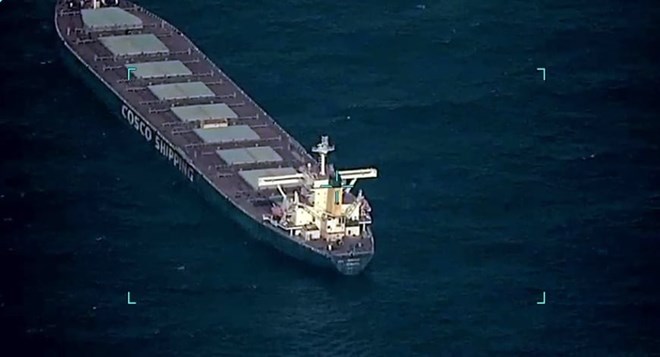
Friday January 5, 2024

Mogadishu (HOL) - The Indian Navy rescued all 21 crew members, including 15 Indian nationals, during an operation from the hijacked cargo vessel MV Lila Norfolk off the coast of Somalia. The vessel, bearing the Liberian flag and bound for Bahrain from Port Du Aco in Brazil, was intercepted by pirates east of the Somali port town of Eyl on Thursday evening.
The Indian destroyer, INS Chennai, swiftly responded to the distress signal relayed to the United Kingdom Maritime Trade Operations (UKMTO). Elite Marine Commandos (Marcos) boarded the vessel after a forceful warning to the pirates and ensured the safe evacuation of the crew from the citadel – the ship's fortified area. Subsequent sanitization operations confirmed the absence of hijackers.
Steve Kunzer, CEO of Lila Global, expressed relief over the safe return of the crew and vessel. The Indian Navy's prompt action highlighted the ongoing risks posed by piracy in the region despite a significant decrease in such incidents since their peak between 2008 and 2011.
Cyrus Modi from the International Maritime Bureau noted that Somali pirates have historically demonstrated capabilities to board vessels far from the coastline. The recent shift of naval resources to the Red Sea, focusing on threats from Yemen's Houthi militants, has raised concerns about a potential resurgence in piracy.
The Indian Navy's ongoing efforts to restore power and propulsion systems on the MV Lila Norfolk aim to ensure the vessel's safe passage to its next port of call.
As the Indian Navy works to restore power and propulsion systems on the MV Lila Norfolk, ensuring its safe passage to the next port, the broader impact of piracy on international shipping is evident. This recent hijacking is part of a concerning pattern in the region. Since late November, there have been three significant piracy incidents, including two hijackings in the Arabian Sea and a boarding in the Gulf of Aden, reflecting a resurgence of piracy that the international maritime community had hoped was waning. Among these, the hijacking of the cargo vessel Ruen on December 14 stands out. The vessel, seized 700 nautical miles east of Bossaso, Somalia, remains off the coast of the Somali province of Puntland. Despite the efforts of EU and Indian naval forces monitoring the vessel, the status of the 17 remaining crew members, after one was released for medical care following a shooting, remains uncertain.
Furthermore, on November 26, the tanker Central Park faced a boarding by five armed individuals in the Gulf of Aden. A prompt response by a U.S. destroyer led to the arrest of the perpetrators, identified as Somali nationals. The incident took a turn when two ballistic missiles were launched from Al-Houthi-controlled territory in Yemen, landing near the vessels, although no casualties or damage were reported. These events have raised alarms over the interconnected threats in the region, particularly how the instability in Yemen and activities of Al-Houthi rebels might be influencing piracy off the coast of Somalia.
Adding to the complexity, at least five Iranian fishing vessels have been hijacked, purportedly in retaliation for illegal fishing activities that threaten the livelihoods of local Somali fishermen. There are concerns that these vessels could be used as motherships for further piracy operations, expanding the threat to a broader area, including near the Yemeni coastline. The surge in attacks by Iranian-backed Houthi militants in the Red Sea, a crucial maritime corridor, has compelled major shipping firms like Maersk to reroute their vessels around Africa's Cape of Good Hope, drastically altering traditional shipping routes and impacting global shipping efficiency. This strategic shift, while improving safety, comes with significant economic costs, including longer journey times and increased operational expenses.
The economic ramifications are significant. The diversion around Africa can extend journey times by approximately ten days and impacts the global shipping industry's efficiency, as the Suez Canal, bypassed by this reroute, traditionally accommodates around one-third of international container ship cargo. Redirecting ships around the southern tip of Africa can incur up to $1 million in extra fuel costs per round trip between Asia and Northern Europe. These escalated costs and extended travel times will likely ripple through global supply chains, affecting prices and delivery schedules.
In response, the United States launched Operation Prosperity Guardian, a multinational operation to patrol commercial shipping in the Red Sea. Since the operation's inception in mid-December, about 1,500 merchant ships have safely passed through the Red Sea. However,the Houthi rebels have launched 25 attacks against commercial vessels in the area since mid-November, including a recent attempt using an unmanned surface vessel.